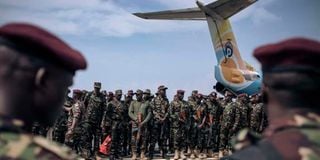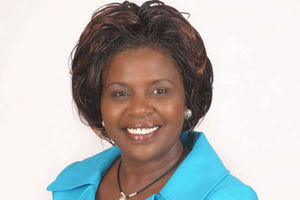More East African soldiers withdraw from DR Congo

Kenyan soldiers from the East African Community regional force (EAC-RF) prepare to leave the Democratic Republic of Congo, at Goma airport, on December 3, 2023.
What you need to know:
- The seven-nation EAC first deployed troops in the violence-plagued region in November 2022, at the invitation of the DRC authorities.
- President Felix Tshisekedi and local residents accused the force of cohabiting with the rebels rather than forcing them to lay down arms.
About 250 South Sudanese soldiers left Goma on Friday, the latest group from an East African Community (EAC) regional force to withdraw from the strife-torn eastern Democratic Republic of Congo after Kinshasa refused to renew its mandate.
The seven-nation EAC first deployed troops in the violence-plagued region in November 2022, at the invitation of the DRC authorities, to free areas taken by the resurgent M23 rebel group.
But the future of the deployment was thrown into doubt after President Felix Tshisekedi and local residents accused the force of cohabiting with the rebels rather than forcing them to lay down arms.
AFP reporters saw early Friday a group of South Sudanese soldiers leaving the provincial capital of North Kivu, Goma.
The soldiers took off from Goma airport around 5:20 am local time (0320 GMT), bound for Juba.
A source from the EAC said the South Sudanese contingent left in three rotations throughout the day.
Ugandan and Burundian soldiers should also leave in the coming weeks, the same source said, with the regional force's withdrawal expected to be complete by January 7.
Last Sunday, nearly 300 Kenyan soldiers who were also part of the East African force -- whose mandate ended on Friday -- left Goma.
"The last component to leave will be the headquarters" of the regional force, the EAC said in a statement.
Outside of the EAC force, Burundian and Ugandan forces are also deployed in DR Congo under bilateral agreements with Kinshasa.
Rebels from M23 (the Movement of 23 March) re-emerged in North Kivu in late 2021, seizing large swathes of the province with backing, according to several Western countries and independent UN experts, from neighbouring Rwanda, another EAC member -- although Rwanda denies this.
Kenyan soldiers began arriving in Goma a year later, at the invitation of the DRC authorities.
All but the Burundian contingents of the East African force were later accused by Kinshasa and locals of colluding with the rebels.
Late last month, the EAC said the DRC, which is a member of the bloc, had decided not to renew the force's mandate beyond December 8.
Kinshasa is hoping to replace the EAC soldiers with security forces from the Southern African Development Community (SADC), of which the DRC is also a member.
Fighting continues between M23 and the DRC army, supported by militia who call themselves "patriots".
Numerous armed groups and other militias have been active for three decades in the east of the DRC, a legacy of the regional wars that erupted during the 1990s and 2000s.
A United Nations mission, known as MONUSCO, has also been present in DR Congo since 1999 and comprises some 14,000 peacekeepers.
But it, too, is deeply unpopular due to perceptions that it has done little to stop violence.
The government in Kinshasa has asked for its "accelerated" departure from December 2024.
The impoverished central African nation is due to hold presidential, parliamentary and municipal elections on December 20.
Due to the M23 rebellion, voting will not take place in two territories in North Kivu.





